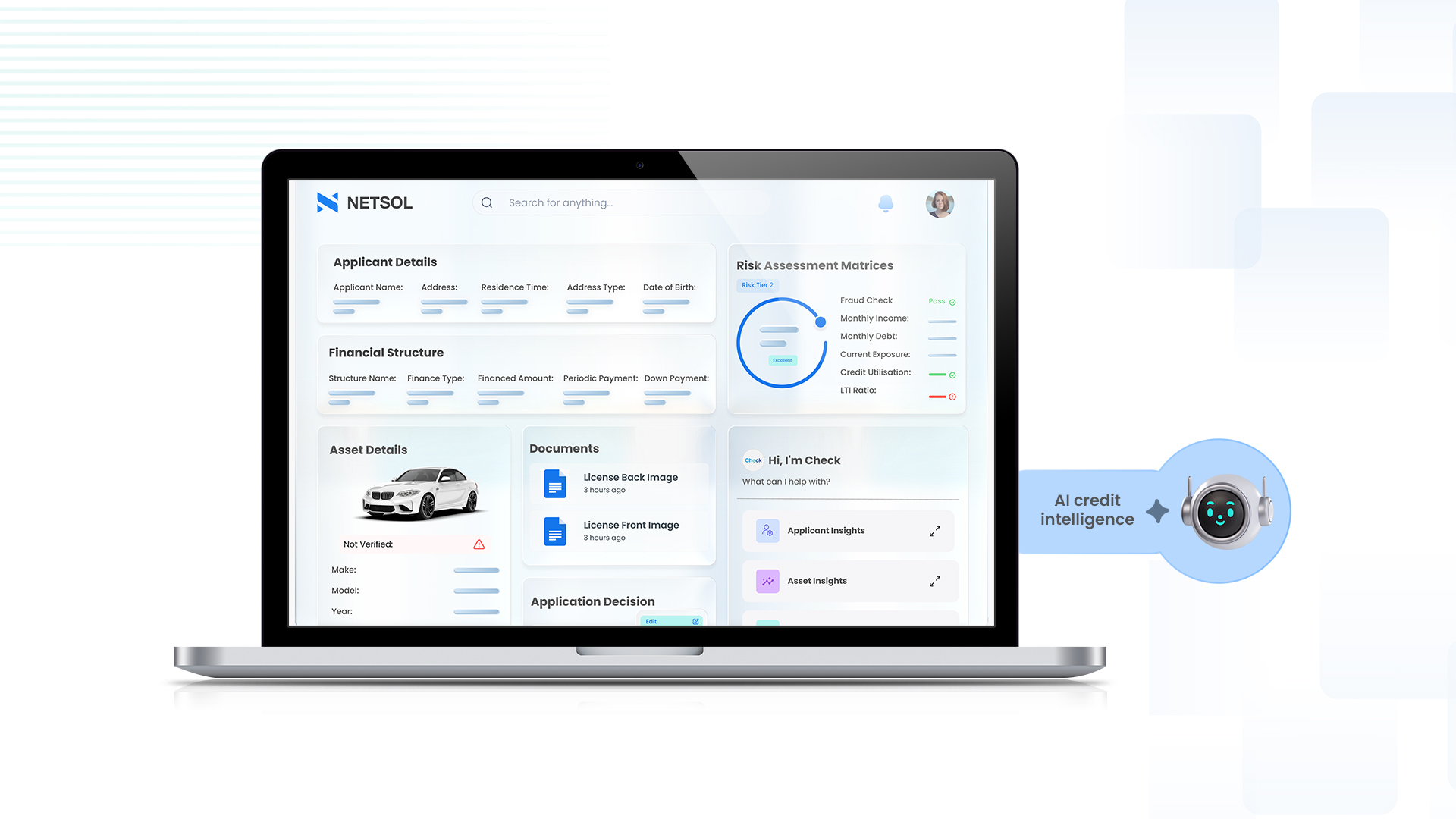Blog
Boosting returns through specialisation in asset finance - Key insights from AFC’s webinar
By NETSOL Technologies , on May 23, 2025
Explore insights from NETSOL's webinar on asset finance specialisation - how niche focus, tech, and expertise drive profitability, reduce risk, enhancing customer trust.

We were delighted to sponsor Asset Finance Connect's latest webinar on specialisation in asset and equipment finance. As a strategic partner and active contributor, NETSOL Technologies brought deep domain insights to the table, helping to unpack how specialised lending models are reshaping profitability, risk management, and customer engagement in today's competitive landscape.
The webinar panel featured prominent industry leaders, including:
- Ed Thompson, General Sales Manager, John Deere Financial
- Graeme Lines, Novuna Finance
- Steve Bolton, Managing Director, PEAC Solutions UK
- Jason Hurwitz, Sales Director, NETSOL Technologies Europe
Moderated by AFC’s David Betteley, the discussion explored strategic insights into specialisation and what this evolving trend means for the future of lending.
The case for specialisation in asset finance
Asset finance lending is increasingly competitive with margins compressed as operators seek continued lending growth and ways to improve returns. Part of the answer could be increased specialisation that can command increased price. While generalist lenders provide a broad range of financing options, specialists focus on specific sectors, allowing them to tailor solutions to meet the unique needs of clients and industries.
Ed Thompson, General Sales Manager at John Deere Financial, described specialisation as more than narrowing your market:
“We work in one field, if you’ll pardon the pun, and understand our customers’ pressures deeply. That’s what defines us as specialists.”
This approach allows lenders to craft offerings that resonate with specific industries, from agricultural equipment to construction fleets. The benefits include:
- Better risk profiling
- More accurate residual value forecasting
- More confidence in back-end asset management
- Disposal and stronger client loyalty
- Premium pricing and reduced cost of risk
Jason Hurwitz, Sales Director at NETSOL Technologies Europe, reinforced that:
“These businesses are the customer’s life’s work. They can smell inauthenticity a mile off. A generic lender will lose them. A specialised one builds trust—and margin.”
This deep understanding of customer needs enables lenders to reduce risk, optimise portfolio performance, and provide more competitive financing options.
Diversification and risk management
A recurring question during the webinar was whether specialisation creates concentration risk. After all, focusing on one vertical may limit diversification.
But the panel showed how risk can be mitigated through:
- Strategic partnerships with dealers and vendors
- Real-time visibility into asset resale markets
- Intelligent RV (residual value) management
John Deere, for instance, works closely with its dealer network to maintain asset values and manage resale.
 Our dealer partnerships are critical. They’re not just sales partners—they’re also our disposal agents.” – Ed ThompsonGeneral Sales Manager, John Deere Financial
Our dealer partnerships are critical. They’re not just sales partners—they’re also our disposal agents.” – Ed ThompsonGeneral Sales Manager, John Deere Financial
Steve Bolton, Managing Director of PEAC Solutions UK, emphasised the importance of broad expertise and market knowledge in setting RVs:
“A high residual value might help you win business, but if it's not grounded in market reality, it will hurt you later.”
Leveraging technology to scale specialisation
While human expertise is essential, technology enables lenders to scale specialised services efficiently, reducing operational costs and enhancing client experiences.
For example, with NETSOL’s Transcend Finance platform, lenders can run multiple specialised journeys within a single system, customising sales, credit, risk, and servicing workflows for different asset classes or industry verticals.
Jason Hurwitz emphasised that technology enhances expertise rather than replacing it. "Tech only plays part of the solution," he explained. "You need genuine expertise alongside technology to deliver value to your customers."
This hybrid approach, where technology and human knowledge work in tandem, is essential for delivering authentic specialised services at scale.
 AI is a great enabler, but it’s human expertise that tells AI what to do. Without deep sector knowledge, tech alone can’t deliver genuine specialisation.” – Jason HurwitzSales Director, NETSOL Technologies Europe
AI is a great enabler, but it’s human expertise that tells AI what to do. Without deep sector knowledge, tech alone can’t deliver genuine specialisation.” – Jason HurwitzSales Director, NETSOL Technologies Europe
Key ways technology supports specialisation
- Modular lending platforms allow lenders to serve multiple niches simultaneously with tailored experiences
- Configurable scorecards and rules engines enable fast but contextual credit decisions
- AI and predictive tools can assist—but not replace—human-led RV management
The role of specialisation in margins and market position
Throughout the webinar, there was a clear consensus that specialisation is closely linked to improved margins. Specialising in specific asset classes allows lenders to charge a premium for their services due to their deep understanding of the market and the ability to tailor solutions to meet unique client needs. This expertise leads to more accurate risk assessments, better residual value management, and ultimately, higher returns.
 The key to success is understanding the full lending value chain—from customer needs to regulation and credit appetite—and aligning it with specialised teams.” – Graeme LinesNovance Finance
The key to success is understanding the full lending value chain—from customer needs to regulation and credit appetite—and aligning it with specialised teams.” – Graeme LinesNovance Finance
Specialisation can also help lenders mitigate risks that are more prevalent in generalist models, such as mispricing or mismanagement of assets. For example, lenders focusing on specific asset types, such as construction equipment or agricultural machinery, can better anticipate market changes and adjust their strategies accordingly.
Looking ahead: The future of asset finance specialisation
The future of asset finance lies in the ability to combine deep industry knowledge with cutting-edge technology to deliver specialised services at scale. The panelists agreed that as the asset finance industry evolves, specialisation will continue to be a key driver of success. However, it is crucial for companies to balance specialisation with the ability to scale efficiently, leveraging technology to enhance customer journeys, reduce costs, and maintain profitability.
Captives and independent lenders alike will need to continue focusing on niche sectors, but they must also ensure that they can adapt to changing market conditions. The integration of AI, machine learning, and advanced data analytics will play a pivotal role in helping lenders navigate these changes and improve their decision-making processes.
Furthermore, the increasing regulatory landscape, particularly in the wake of the Supreme Court judgment, will require lenders to maintain strong compliance practices while pursuing specialisation. Navigating this complexity will require both specialised knowledge and the right technological tools to ensure that lenders remain competitive and can manage compliance confidently.
 Tech supports compliance, but specialisation in regulated lending is a must. You need the right people and systems working together.” – Graeme LinesNovuna Finance
Tech supports compliance, but specialisation in regulated lending is a must. You need the right people and systems working together.” – Graeme LinesNovuna Finance
Key takeaways
Specialisation drives stronger returns: Specialising in specific asset classes allows lenders to tailor their solutions, reduce risks, and increase margins by offering premium services.
Technology enhances specialisation: Technology, particularly platforms like Transcend Finance, enables lenders to scale their specialised offerings while maintaining high levels of service and operational efficiency.
Expertise remains essential: While technology plays a crucial role, human expertise is still the backbone of successful specialisation. Lenders must combine both to deliver genuine value to their customers.
Collaboration mitigates risk: Strategic partnerships, such as those between captives and their dealer networks, can help manage concentration and residual value risks.
Regulation will shape the future: As the regulatory environment evolves, asset finance companies will need to stay agile and adapt their specialised offerings to comply with new standards.
Conclusion
The message is clear: asset specialisation can be a strategic advantage.
Lenders who combine deep market knowledge with the right technology can deliver differentiated services, scale with confidence, and outperform generalists in today’s complex financial landscape.
If you missed the webinar, be sure to watch it here to explore how your organisation can adopt specialisation as a growth lever. The future of asset finance is specialised, and NETSOL is here to help you navigate it with confidence.
Stay tuned for more insights and updates from NETSOL Technologies as we continue to drive innovation in asset finance and leasing!
Related blogs

Blog
From credit checks to credit intelligence: How AI is redefining underwriting for captives

Blog
Shared financing models for high-value assets unlocking Indonesia’s next wave of growth

Blog



